Utah may well be the most beautiful natural state in the country, with its mountains, deep canyons, and inspiring national parks.
There are a lot of wide-open spaces as well.
The cost of living is not cheap though, so you need some money to live here in comfort.
There are a few cities, but it is mostly very rural with very small towns, which takes some getting used to for some people.
You will either love the remoteness, or it will drive you crazy.
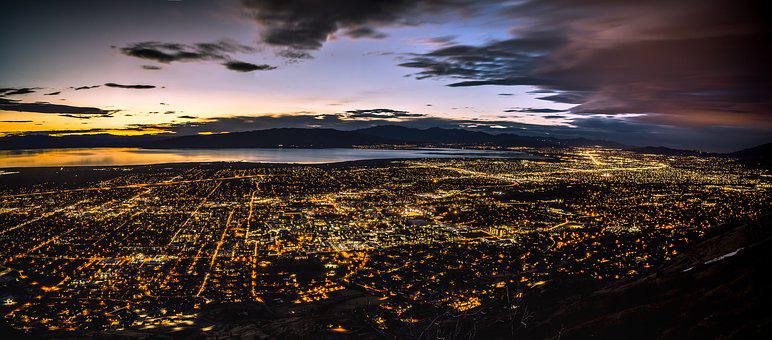
Contents
Pros of Living in Utah
1. Wilderness
If you love the outdoors and wide-open spaces, you will like Utah.
One-third of the state’s population lives in the largest city – Salt Lake City.
There are lots of remote areas, in mountains or otherwise, where there are very few people and few roads.
It is a high desert, so it is dry most of the time, but there is a lot of snow in winter.
The lower two-thirds or more of the state is wilderness, with rugged mountains and very small towns.
2. The National Parks
There are five national parks in the southern part of the state that are national treasures.
Millions visit every summer and they can get crowded, and tourism continues to grow.
The National Parks are Arches, Capitol Reef, Bryce Canyon, Canyonlands, and Zion.
There are hundreds of miles of trails in these parks, very remote areas of amazing rock formations, as well as waterfalls and small rivers.
There are also state parks in the area. Lots of public lands are available for recreation.
3. Year-round fun
There are four distinct seasons, and most of the year is temperate and dry.
Snow in the mountains provides excellent skiing.
There are thousands of miles of trails to hike.
The fall is crisp but not overbearingly cold.
Winters are not bad in the lowlands, but snow can get heavy in upper elevations.
Spring is very pleasant and summers are not overbearing.
Any outdoor activity you could want is available in Utah.
4. Low crime rate
Even in the larger cities, the crime rate is low.
Overall, the violent crime rate is 40 percent below the national average.
Out in the small towns in rural areas, the crime rate is almost nonexistent, fully 80 percent below the national average.
Utah has a homicide rate of 2.4 per 1,000,000 and the national rate is 5.01
The violent crime rate has gone up slightly in recent years, but it still has one of the lowest crime rates in the nation.
5. Strong education system
Utah grades k-12 have above-average test scores in many subjects, and the schools are highly rated.
There are also quality junior colleges and four-year institutions of education.
With its quality education, it is remarkable that Utah also spends less per pupil than any other state, at $7,954 per student.
The state has larger school districts, which cuts down on some expenses.
Many students have two college-educated parents at the home to help them with the school as well.
6. Growing state
Utah is growing at about 18 percent per year over the last 10 years.
Tourism is part of that, and more people want a rural-type lifestyle.
Still, the state has only around three million people and has a lot of space available.
That has allowed the state to grow without having problems of urbanization, or other problems that often arise with an increase in the population.
The growth may also account for the fact that Utah is a young state, with one of the lowest median ages in the nation.
7. Nice people
Utah people are friendly and generous, and always willing to lend a hand.
They are also known for being generous with donations to charity.
Some of that may be the Mormon influence, a much of the state has a strong religious presence.
They are also used by visitors and support the burgeoning tourism industry, especially in the national parks.
8. Strong economy
Utah has a strong economy.
The unemployment rate is one of the best in the nation, below three percent.
High-tech jobs have grown by 70 percent in recent years.
US News ranked Utah as having the best state economy in the nation.
It has lower taxes on businesses than most states, which encourages businesses to move there.
It is a good place to start a business too, with a business-friendly climate.
Utah leads the nation with just less than one percent of its residents below the poverty level.
Cons of Living in Utah
1. Weather
The southern half of the state is called the high desert, and in summer it can get very hot.
Temperatures can reach 100 and there is little, if any, water available.
In winter there are temperature inversions in the northern part of the state that trap polluted air near the surface and create low air quality.
In the mountainous areas, there can be a lot of snow falling in a hurry.
The weather is ok most of the year, but the extremes can get tricky.
2. High taxes
Businesses get tax breaks, and that helps the economy.
Those breaks do not fall to private citizens though.
There is a flat tax of 4.9 percent on all income, which is one of the highest in the nation.
Sales taxes are also high, starting at seven percent from the state.
Local governments can add to that in local areas.
Utah has the 15th highest tax burden at 9.19 percent, and it has the ninth highest income tax.
3. Not much diversity
Most of the people in Utah are white, and most are Mormons.
There is not much diversity along racial lines and not much along religious lines.
Even so, Utah people have a reputation for being friendly, accepting, and helpful.
You may not face persecution, but if it is important to have more diversity, you might prefer somewhere else.
4. Housing costs
The average house in Utah will set you back $300,000, and that is not a lot higher than the national average.
There are some areas around Salt Lake City and some other popular areas where a house will cost more than $500,000.
Salt Lake City itself is more costly than the rest of the state and is more than the national average.
Utah has the largest homes in the nation, averaging 2300 square feet.
Homeownership rates are also higher than the national average.
5. Remote areas
There can be long areas where there is nothing but rocks and dirt, and those rocks may be beautiful.
You could drive more than 100 miles without seeing a town or a gas station, so you need to keep that in mind when traveling.
Some remote areas do not have cell phone service, so if you do get stranded you will be in for a very long walk.
There is one stretch of Interstate that goes 100 miles without an exit or any legal means of turning around.
6. Outdated alcohol laws
There has been some improvement in recent years, but Utah has some old-fashioned laws when it comes to the consumption of alcohol.
Most of the state still allows only 3.2 beers to be sold in bars or restaurants.
If you want stronger, you have to go to a liquor store.
Those stores are not open on Sundays or on national holidays.
In most restaurants, you cannot buy alcohol unless you also buy food.
There is also a time when all sales stop, whether that is at midnight or a little later.
7. Fast drivers
It can be long-distance to anywhere, even to your neighbor’s house.
It could be more than 100 miles to the next town.
As a result, people in Utah tend to put their foot down when driving the highways and go really fast.
There are some state troopers around to control the speeding to some degree, but you may find yourself getting passed by very fast cars, which can be unnerving.
8. Public transportation
There is some good public transportation in Salt Lake City, but not much of it anywhere else.
You will need a car if you want to live anywhere other than Salt Lake City, and you will need one if you live in the suburbs.
Small towns have none, and there is very little available to get you from town to town.
There are a lot of small towns in remote areas, and it would probably not be efficient to have public transportation for them, but if you want to go there, you will have to get a car.

Pros and Cons of Living in Utah – Summary Table
| Pros of Living in Utah | Cons of Living in Utah |
|---|---|
| 1. Wilderness | 1. Weather |
| 2. The National Parks | 2. High taxes |
| 3. Year-round fun | 3. Not much diversity |
| 4. Low crime rate | 4. Housing costs |
| 5. Strong education system | 5. Remote areas |
| 6. Growing state | 6. Outdated alcohol laws |
| 7. Nice people | 7. Fast drivers |
| 8. Strong economy | 8. Public transportation |
Utah Safety Overview
READ THE FULL REPORT: Utah Safety Review
Safety Index: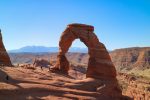
- OVERALL RISK: LOW
- TRANSPORT & TAXIS RISK: LOW
- PICKPOCKETS RISK: LOW
- NATURAL DISASTERS RISK: MEDIUM
- MUGGING RISK: LOW
- TERRORISM RISK: LOW
- SCAMS RISK: MEDIUM
- WOMEN TRAVELERS RISK: LOW
Frequently Asked Questions
Why are there so many Mormons in Utah?
In 1847, Mormons came to Utah to escape persecution.
Over the next 20 years, thousands more followed and the area became a home for them.
Utah became a state in 1896 and by then most Mormons lived in Utah.
Sixty-two percent of people in Utah identify as Mormons, and that percentage used to be a lot higher.
What is special about the Great Salt Lake?
It is the largest lake west of the Mississippi River and the largest salt lake in the Western Hemisphere.
It has several islands, and three state parks, and is a major tourist attraction.
It is four times saltier than any of the world’s oceans.
It is a huge lake but only about 14 feet deep in most places.
Why is Salt Lake so salty?
It has several tributaries flowing into it, but none flowing out.
When the water evaporates, minerals and salt are left behind, and it becomes salty as a result.
Lakes with no outlet tend to become salty.
What is the Temple square?
The temple square is the center of history for the Mormon church.
It takes up five city blocks in Salt Lake City and is filled with historic sights and exhibits.
The temple was started in 1853 and it took 40 years to complete.
The temple is the centerpiece of the square.
It is a holy place for Mormons but has many visitors who are not Mormons.
It is visited by more people than the five national parks.
What cost of living items are cheaper in Utah?
Housing costs a lot, but general living expenses are lower than the national average.
Groceries are seven percent below the national average.
Utilities are about five percent below the national average.
Transportation, including your own vehicle, is about eight percent below the national average.
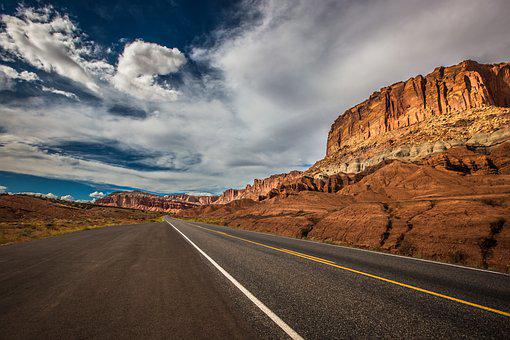
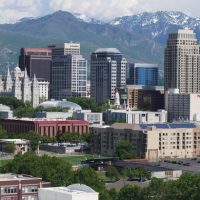
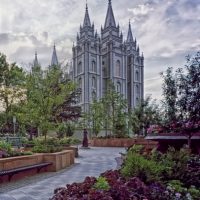
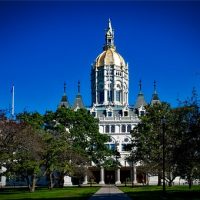
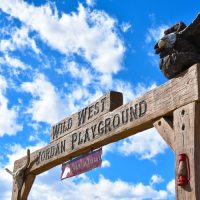
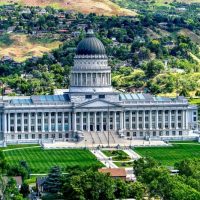
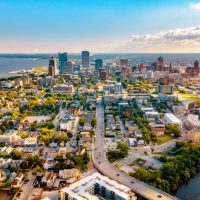





If you’re going to talk about the Great Salt Lake being salty you should at least mention Lake Bonneville and the Salt Flats. How hard it is to drown in the giant lake. You know, the location Jack Sparrow was filmed going crazy (with the crew of Jacks) in Davy Jones’ Locker. Where new, high-speed cars test their racing skills. How you can stand at one end of The Great Salt Lake and not see the other side, like an ocean. Certain areas, anyway.
There was no mention of the high homelessness rate in Salt Lake City, especially downtown you can’t go a block without seeing at least three homeless people—who aren’t panhandling, btw. We can get dirt devils (little dust tornados) and blizzards.
Utah raised the beer sales to be 5% or under in stores, but it also lowered its state BAC level to .05% rather than the National average of .08%. That lowering was also in exchange for them removing “Zion curtains,” barriers preventing customers from seeing bartenders make drinks. Yep, walls come down and so does legal drinking limit.
Utah voters also legalized medical marijuana, then the largely-Mormon, mostly-conservative lawmakers put a stay on it (stopped the law from finalizing) for two years while they tried to research ways to prevent the vote going through.
Low crime has been spoken of but we’ve had a couple doozies. Ted Bundy, Elizabeth Smart, Susan Powell are all connected to Utah.
This state can be great, but it can be awful. I know, I live in Provo and I’ve only seen 8.5 years combined in other states.
horrible
Let’s me realistic here, I am betting this is older. Most houses are 500k to 600k in areas not in Salt Lake City. Domestic Violence and Sexual Assault is on the rise, where we are 1 in 3 where the national average is 1 in 4.
Homeless is on the rise while rent and housing prices rise the few homeless shelters fill up. The recent record breaking snow can help but the great salt lake is getting to the point if it drys up we will get arsenic coming out.
Utah is beautiful to visit, go ski, go explore the national parks, get over priced weak drinks.
But avoid the LDS, and Healthcare that is so great because everyone avoids it. Also if your not white, LDS, or here for Sundance… do not go to Provo.
Don’t be a Bigot.
The correct name of the church is, “The Church of Jesus Christ of Latter-day Saints”. The members believe in Jesus Christ and recognize Him as their Savior and Redeemer. The term “Mormon” comes from the “Book of Mormon” which is a book of scripture similar to the Bible. This book is another testament of Jesus Christ and acts as a companion to the Bible to further witness of Christ and His doctrine. Many people have heard the term “Mormon”, but don’t know the whole story. So just wanted to clarify that members of the Church of Jesus Christ are christians and they believe in Christ.
The book of Mormon was ‘written’ by Joseph Smith, the ‘founder’ of Mormonism. He thought the Christian Bible was not good enough and people should have to do ‘good works’ to go to heaven.
That is the difference between the cult like human writings of Mormonism, and Christianity.
was not written translated and he studied the bible and believed it was good enough and that led to the translation of the book of Mormon not creation also is not a cult and like utah citezen said yeah for a true full account read saints volume 1 and 2
Apparently you can’t be an idiot and go to heaven wowwwww. Unbelievable. You can’t act like ebeneezer scrooge and go to heaven WOWWWW. Also contrary to popular belief, Mormons are Christians. You would know this if you payed attention to life around you. Go get a life and stop trying to dis the Church.
And also. Maybe there wouldn’t be a surplus amount of Mormons in Utah if people like you hadn’t tried to kill the saints and burn their homes down. Do your research next time.